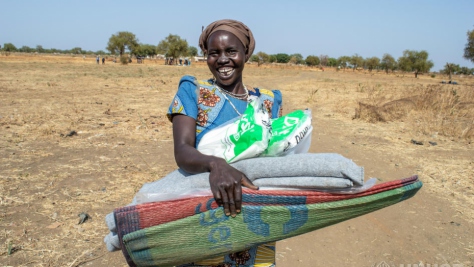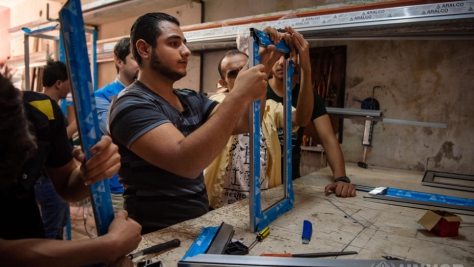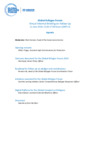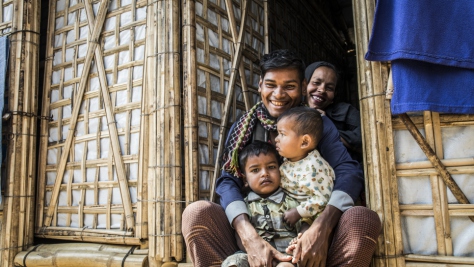Ethiopia: Somali refugees to be relocated away from border
This is a summary of what was said by UNHCR spokesperson Jennifer Pagonis – to whom quoted text may be attributed – at today's press briefing at the Palais des Nations in Geneva.
In Ethiopia today (Friday), UNHCR teams are expected to start relocating a group of 500 newly-recognized Somali refugees who fled from renewed conflict in strife-torn south and central Somalia over the last year. They have been staying around the Kebribeyah area, near the Somali border in eastern Ethiopia and are being relocated to a re-opened UNHCR camp at Teferi Ber.
The refugees are part of a group of 4,000 Somali refugees who have recently been granted refugee status by UNHCR and the government's Authority for Refugees and Returnees Affairs (ARRA). An estimated 7,000 additional Somalis who also claim to have fled fighting and insecurity in Somalia, are waiting to be screened at other sites in eastern Ethiopia.
The new camp site at Teferi Ber, some 120 km north of Kebribeyah, was formerly a UNHCR camp which in the 1990s hosted some 49,000 mainly Somalis refugees who had fled fighting in their country. The camp was officially closed in 2001 after all the refugees returned, mainly to the self -declared republic of Somaliland.
After arriving at Teferi Ber, the refugees will spend three days in a reception centre where they will be allocated plots of land to construct homes and given building materials. They will also be given food as well as tarpaulins, blankets, sleeping mats, kitchen sets, jerry cans, kerosene stoves, and soap. The ARRA has established a temporary health centre until permanent structures can be built.
The Somali Region of Ethiopia already hosts more than 16,500 refugees. With the new arrivals, the total is 20,300. At the peak of the Somali refugee crisis in the early 90s, the region hosted 628,000 refugees in eight camps. The overwhelming majority went home between 1997 and 2005, and all of the camps were closed except a camp at Kebribeyah.
Related news and stories
Thousands of newly arrived Somali refugees in Ethiopia relocated to new settlement
Samira's Story
Drought brings life-threatening food shortages for refugees in Ethiopia
100,000 new Somali refugees arrive in Ethiopia in the past month, UN and partners are calling for urgent funding
UNHCR teams and partners rush assistance to some 100,000 newly arrived Somali refugees in hard-to-reach area of Ethiopia
As the Horn of Africa drought enters a sixth failed rainy season, UNHCR calls for urgent assistance
-

Global Refugee Forum - Second Informal Follow-up briefing held on 11 June 2020 (PDF)
12 Jun 2020 This Powerpoint Presentation was being used during the second virtual informal briefing to discuss follow-ups to the Global Refugee Forum 2019. -

Mental health and psychosocial support
11 Jun 2020 -

Time running out for civilians in Africa's Sahel region as attacks multiply
11 Jun 2020 -

Young Ivorian artist designs 2020 World Refugee Day emoji
11 Jun 2020 Graphic designer O'Plérou made world headlines with 365 emojis that change the way people see Africa. Now he has turned his creative spotlight onto refugees. -

South Sudanese refugees make tippy taps to promote hygiene in DRC camps
10 Jun 2020 A simple yet effective hygiene initiative is helping refugees make their own handwashing devices to fight COVID-19 in the Democratic Republic of the Congo. -

Qatar Airways
UNHCR and Qatar Airways' partnership agreement will see UNHCR utilize the Qatar Airways fleet for the shipment of core relief items to country operations all around the world. -

Silatech
In November 2018, UNHCR, the UN Refugee Agency, and Silatech signed a cooperation agreement aimed at supporting UNHCR's protection and assistance activities for refugees and displaced persons globally. -

Second informal briefing- agenda
9 Jun 2020 -

Thani Bin Abdullah Bin Thani Al-Thani Humanitarian Fund
In April 2019, Thani Bin Abdullah Bin Thani Al-Thani Humanitarian Fund contributed more than US$35 million in support of Rohingya refugees in Bangladesh and displaced Yemenis in the form of Zakat through UNHCR.
